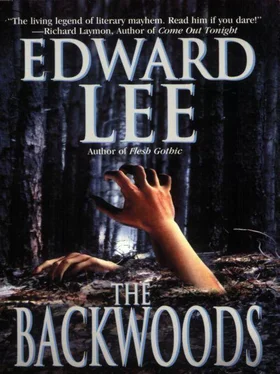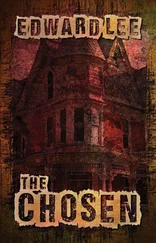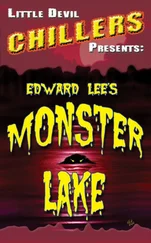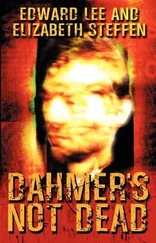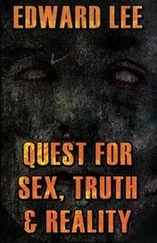“There are if one of ‘em had a machete in his paw,” Trey pointed out.
I just can’t win here, Sutter thought.
Pappy spit brown juice into a Yoo-Hoo bottle. “And ain’t it funny ‘bout how Dwayne gets his ticket punched right in the middle of all this talk about some Squatters disappearin’. Like maybe he had somethin’ to do with it.”
“Or done it himself,” Trey said.
Now Sutter was grinding his teeth. “Done what himself, Trey?”
“Offed some Squatters. Dwayne hated the Squatters; everyone knows that.”
“Listen to me, both of you.” Sutter’s voice hardened. “There ain’t no Squatters who disappeared . It’s bullshit.”
“Nearly a dozen’s what I heard,” Pappy offered.
“Here one day, gone the next,” Trey said.
This was getting hairy. “You two boneheads listen up. Ain’t nobody’s disappeared ‘round here. It’s a free country. Some of these people think they can do better some-wheres else than here . . . and that’s their right. There ain’t nothing wrong with Squatters just’cos they’re a little funny-lookin’ in the face. They’re just as smart as anyone else and just as able to work. Some of ‘em get tired of crabbing, so they move on. Like anywhere.”
Sutter’s sensible explanation didn’t seem to convince the others. It was true that an unusual number of Stanherd’s Squatters had left their abode on the Point, some quite suddenly. Stanherd himself had reported it several times, but even he admitted that they probably did just leave town of their own accord. Sutter did know of the anomaly regarding Dwayne Parker’s death, but of missing Squatters? He knew nothing, nor did he believe any foul play was involved. I swear to God. Gossip mouthpieces like Trey and Pappy Halm just make my job harder . . . .
“So I don’t want to hear no more crap about Squatters disappearing into the night and Dwayne’s fuckin’ head never being found,” he finished.
All three heads turned when the cowbell clanged, and in walked a lean, fortyish man with short blond hair, blue eyes, and an expression that could be deemed somber. He wore a beige windbreaker in spite of the heat, work pants and boots without a speck of dirt on them.
“Howdy, Mr. Felps,” Pappy said.
“Mr. Halm, Chief Sutter, Sergeant Trey,” the man said in return. His voice was light yet somehow edged, sibilant. “Things are going well for you all, I trust?”
“Yes, sir, Mr. Felps,” Sutter replied. Felps’s presence always affected Sutter and most townspeople as something close to regal, for some disjointed reason. He wasn’t necessarily the town’s savior, because Agan’s Point had always been self-sufficient—but just barely. Instead, Felps was the bearer of some energetic new blood that was sorely needed. His Riverside Estates luxury condo complexes would siphon upper-income families out of the state’s overpopulated big cities. There were already several hundred preconstruction sales, along with pricey television ads throughout Virginia. This transplantation would divest Agan’s Point of some of its natural beauty but deliver a much-needed economic shot in the arm. Sutter saw it as the progress he’d waited for all his life, and he saw Felps as its herald. “Things are just dandy ‘round here.”
“And theyʹll be getting even better soon,” Felps said, picking up a coffee and Danish. “You’ve probably noticed that the foundations have already been laid. Things will change around here fast. You’ll all be very pleased.” The man’s enthusiasm, however, seemed dulled, lost in his businessman’s veneer. Sutter supposed any successful construction magnate carried the same air. And what did it matter, anyway? All our lives will improve because of this fella, Sutter realized.
Felps’s stay was brief, to the point. He paid up, bade them a good day, and left.
“Not the friendliest fella in the land,” Pappy said, “but do you think I give a flying fuck? My business’ll triple the first year those condos start opening.”
“He’s a big-city builder, Pappy,” Sutter reminded him. “Guys like that are no-nonsense and all business. That’s why they’re millionaires.”
Trey shrugged, leaning on the counter. “He ain’t such a poker face once ya get to know him. Matter of fact, I had a few beers with him at the bar the other night.”
Sutter felt secretly jealous. “You’re kidding me?”
“Naw. He and a few of his managers walked in. They asked me to join ‘em and we all sat there for an hour shootin’ the shit and pounding a few. When Felps is off the clock, he’s a regular guy just like you and me.”
Sutter’s jealousy remained. If there was one man he wanted to be pals with, it was Felps. I’ll have to work on that. . . .
“Later, Pappy,” he said. “We’re out of here.”
“You boys take it easy the rest of the day.” Pappy cackled. “Don’t wanna wear yourselves out kickin’ scumbag ass.”
“Just another day in the lives of two hardworkin’ cops,” Trey said, casting a final glance at the men’s mags.
Back outside, Sutter didn’t even have time to grab his keys before a shadow moved behind him. He hadn’t heard a sound. Had those drug dealers come back for revenge? Impossible, he thought. They’re lucky if they made it to the nearest hospital on their own . . . . Sutter spun, instinct charging his gun hand, but then found himself looking into the face of a gaunt old man.
“Hey, there, Everd,” Trey greeted.
Everd Stanherd stood like a meticulously dressed scarecrow, neat as a pin in his typical faded black suit and tie. Short jet-black hair didn’t look right atop the old, waxen, and deeply lined face, yet the deep-socketed eyes appeared vibrant, the eyes of a twenty-year-old set in an old man’s skull. The only detail that might tell him apart from any elderly man was the pendant around his neck: a black silk cord connected to a small black silk sack.
Everd lived with his wife, Marthe, in the only house at the end of the point, a decrepit slat-wood mansion built a hundred years ago. Judy Parker let him live there, and he shared the house with other elders of his Squatter clan. The rest of the Squatters lived all about the property surrounding the house, in surprisingly well built tin huts erected in the midst of the heavy woods—Squatterville, most people called the area. Judy let them all live there rent-free as a benefit of their employment with the crab company. In all, the Squatters were respectful, law-abiding, and industrious in their own simple way, and this frail yet vibrant man standing before them was their leader.
“It’s good to see you, Everd,” Sutter said. “Any word on those couple of folks in your clan who can’t be accounted for?”
“No, sir,” Everd replied. They all spoke so strangely, yet Everd’s tone and diction were the strangest of all. His thin lips barely moved around the words, almost as though they were being projected from elsewhere. And that indefinable dialect. “As a matter of fact, two left for Roanoke last week, quite verifiably. I suspect the same can be said of the others, as you suggested. It’s just uncharacteristic for members of our clan to leave without notice.”
“Everd, when I was a kid, I ran away a bunch of times, and never told my parents where I was headed,” Sutter pointed out. “There’s over a hundred Squatters you got livin’ on the Point. You can’t keep tabs on them all.”
“You’re correct, sir,” Everd returned. He stood absolutely motionless as he spoke, save for one crabbed hand fingering the black pouch about his neck. “However, a third member seems to have disappeared—a young girl named Cynabelle—Cindy, to you. But I must confess that she may have fallen with a bad crowd and vacated, too, for more adventurous exploits in the city.” Everd paused, as if about to say something difficult. “She lacked the standard of morality that my clan lives by, and I’m afraid several of the girls have fallen by the same wayside in the past. Not many, but a few. I feel it’s my failing ultimately.”
Читать дальше
